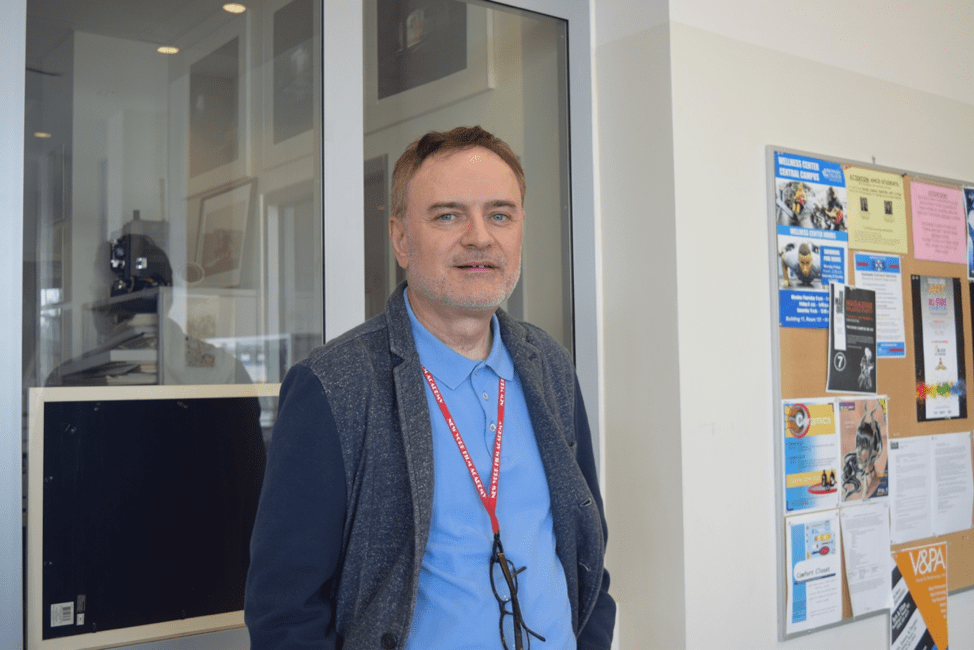Daniela Jaramillo
Staff Writer
Professors are rarely pictured as being something else rather than an educator who goes to class and grades papers. Their background is usually unknown to their students.
Marius Voicu was born in Transylvania, Romania, a place that according to him is great and not that spooky. Since then, he has begun his journey to become what he is today, an educator and a filmmaker.
He had a passion for art since a young age, but his parents didn’t want him to become a “starving artist.” They encouraged him to pursue a degree that will allow him to have financial stability. He followed their advice and got his first bachelor’s degree in Business Administration from the Academy of Economic Studies in Romania.
Although his knowledge allowed him to be more financially responsible and understand economics at the macro level, he knew it was not something he wanted to do for the rest of his life. Voicu continued pursuing music with passion on the sidelines.
In college, he put together a music band called Indigo Campus and started performing. Soon, he got co-opted by some professional musicians to join their efforts and became Kripton’s lead singer. “Fata Morgana,” which can be found on YouTube, is one of his favorite songs.
“We were very unorthodox because back when we started there was a lot of censorship in the country,” said Voicu.
Under a strict communist regime at the time, with Nicolae Ceausescu in power, one of the worst paranoid dictators in Eastern Europe according to Voicu, they started to sing in English. At the time, people who embraced the Western pop-rock culture were seen as “anathema,” damaging to them culturally and politically.
They were invited to record at the National Broadcasting Corporation in Romania. They recorded songs for radio and television as independent contractors. Soon after that, he quit his job and pursue music professionally.
Music gave Voicu the freedom and independence from the system that he disliked. Later on, however, he discovered that they didn’t have the total freedom or independence from the government.
“They would reserve those venues, so we didn’t have access. Although we tried to book in advance, the party was doing something,” said Voicu.
When they were going on tour, the ministry of culture asked them to provide a list of their repertoire to approve it or disapprove it. They “cooked” the books which means they had one official repertoire for the government and then they had the official one they were going to use.
After this, he started his own production company with the PA (Public Address) system that he set.
“Everyone who was a free-lancer was applying pretty much the capitalist system on a small-scale level because we were not owned by the government,” said Voicu.
Furthermore, from 1988 to 1989 he was the lead singer of Romanticii, another high league band in Romania who has been around since the late 1960s.
“In a country of 23 million, I was one of the top ten vocalists. I got to tour with everybody who was somebody,” said Voicu.
After the fall of the Berlin Wall and the end of the Cold war, the political environment in Romania in 1991 was shaken. There was an attempted coup in the former Soviet Union, so he decided to leave to the United States.
He decided to work behind the scenes and obtained an Associates in Science in Music and Video Business from the Art Institute in Fort Lauderdale. Later on, he wanted to be a college professor.
In order to teach at the college level, Voicu obtained a master’s degree in Telecommunications from George Mason University in Fairfax, Virginia.
“They did not have a major in film or video per se but they did have telecommunications which is a very large umbrella for everything from computer science all the way to satellites, the internet and television broadcasting… I was in the right place at the right time. It was the year 1993, where the worldwide web started.”
After he graduated, Voicu started teaching computer science courses and intro to World Wide Web.
“Life is a journey, not a destination. All the positives and negatives that we experience make us richer if we are open to learn,” said Voicu.
Voicu considers himself a life-long learner and since he had a passion for film, he earned his master’s degree in Fine Arts in Film from Miami International University. Now Voicu is a digital filmmaker and media arts professor at Broward College.
“He welcomed his students by saying, ‘I’ve lived a pretty interesting life. I’ve had my time to be a rockstar, but now I teach so you guys can carry the passion on,’” said Kiera Wright, a student from his film editing class.
djar@mail.broward.edu
